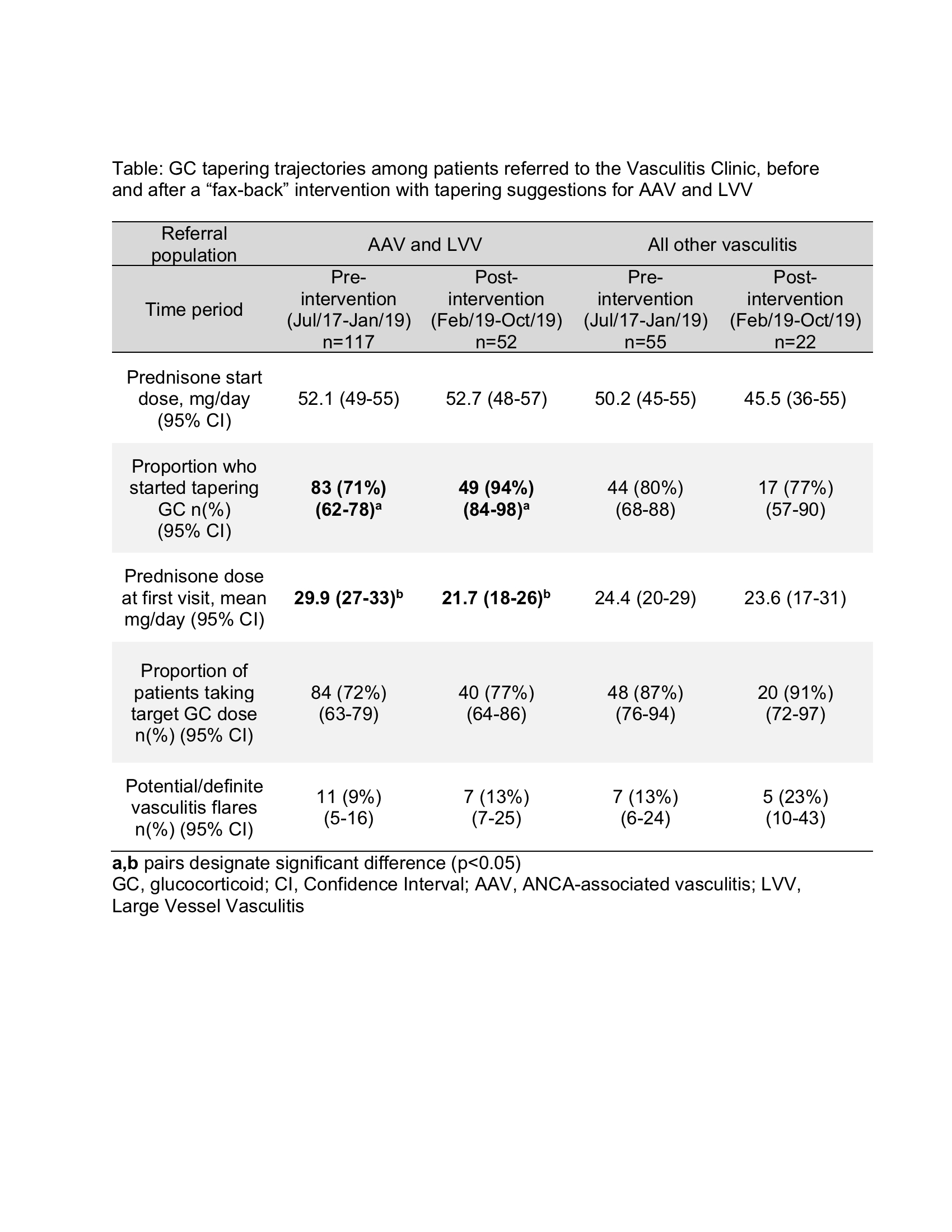Session Information
Session Type: Poster Session D
Session Time: 9:00AM-11:00AM
Background/Purpose: Vasculitis guidelines recommend scheduled glucocorticoid (GC) tapering to avoid toxicity. In an audit of 130 consecutive new patients on GC assessed in our tertiary Vasculitis Clinic (July 2017-October 2018), 33 (25%) were taking prednisone >10mg above target dose, based on GC initiation date. We aimed to increase the proportion of new patients taking appropriate GC doses to >90% by August 2019.
Methods: Interventions were (1) triaging patients on prednisone >20 mg to be seen in < 2 months (2) “fax- back” tapering suggestions based on current ANCA-associated vasculitis (AAV) and large vessel vasculitis (LVV) recommendations, sent to all physicians referring patients on GC. For the first several months, referring physicians’ offices were contacted 1-2 weeks following the “fax-back” to determine if physicians had seen the suggestions. The primary outcome was the proportion of patients taking “appropriate” GC (< or =10 mg above target prednisone dose) at first visit, measured through interrupted time series. Other measures included clinic wait times, the proportion of patients starting to taper GC, and disease flares during tapering.
Results: Following physician triaging (December 2018), mean wait times for new patients on GC decreased from 81 days (95% CI 70-92) in the preceding 6 months to 64 days (95%CI 57-70). After introduction of “fax-back” in February 2019, only 29% of referring physicians were personally seeing the GC tapering suggestions. Following iterative modifications to the “fax-back” format, this increased to 73% by May 2019. Among patients referred for AAV/LVV, comparing pre-intervention (July 2017-January 2019) to post-intervention (February-October 2019) periods, the proportion of patients who had started to taper GC by their first visit increased from 71% (95%CI 62-78; n=83/117) to 94% (95%CI 84-98; n=49/52), and mean prednisone dose at first visit decreased from 30 mg (95%CI 27-33) to 22 mg (95%CI 18-26). Among non-AAV/LVV referrals, GC tapering trajectories did not change during the same periods. The proportion of patients ultimately taking “appropriate” GC doses at their first visit, overall and among the AAV/LVV subset, did not significantly increase after the interventions. Potential/definite disease flares during tapering were similar before and after the “fax-back” intervention.
Conclusion: In this novel “GC stewardship” initiative to limit avoidable harm in vasculitis, we decreased wait times among GC-users. After introducing “fax-back” tapering suggestions, we observed increased tapering and lower GC doses at first visit among patients referred for AAV/LVV. Alternative knowledge dissemination strategies are needed to further improve timely GC tapering in vasculitis.
To cite this abstract in AMA style:
Mendel A, Ennis D, Lake S, Carette S, Pagnoux C. An Initiative to Improve Timely Glucocorticoid Tapering in Vasculitis [abstract]. Arthritis Rheumatol. 2020; 72 (suppl 10). https://acrabstracts.org/abstract/an-initiative-to-improve-timely-glucocorticoid-tapering-in-vasculitis/. Accessed .« Back to ACR Convergence 2020
ACR Meeting Abstracts - https://acrabstracts.org/abstract/an-initiative-to-improve-timely-glucocorticoid-tapering-in-vasculitis/

